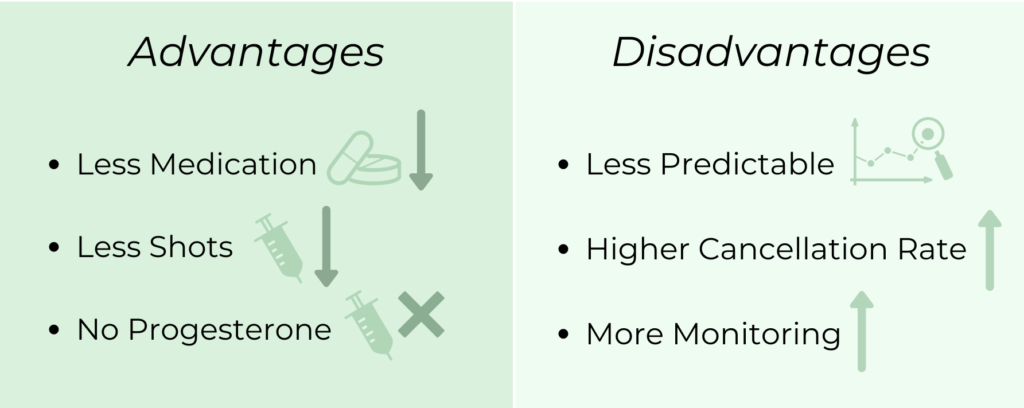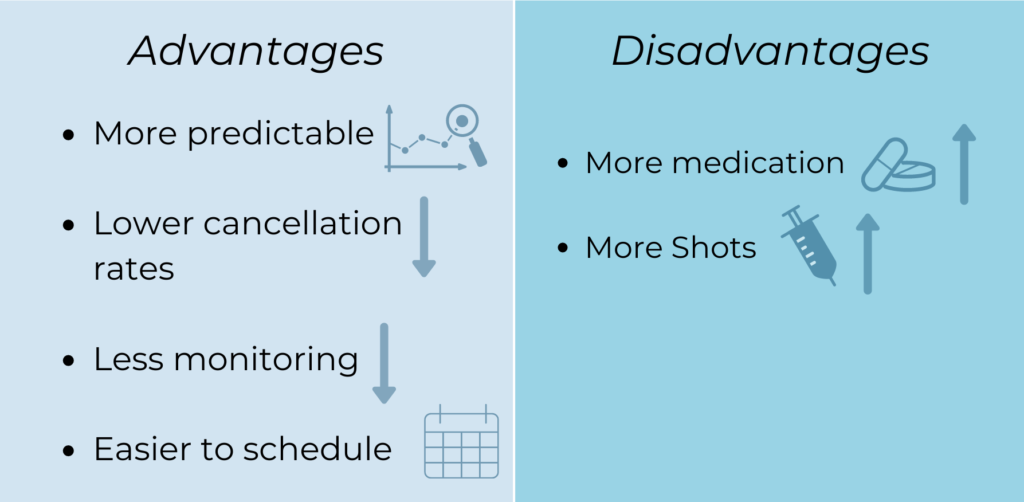nFET
Natural Frozen Embryo Transfer
The physician will recommend nFET to patients who ovulate regularly and wish to use fewer medications for their transfers. The nFET cycle involves letting your body naturally develop a follicle, a trigger shot to induce ovulation, then estrogen and vaginal progesterone supplementation to help support the endometrial lining for a transfer.

Advantages and Disadvantages

HRT FET
Hormone Replacement Therapy Frozen Embryo Transfer
The physician will generally recommend HRT FET to patients who have irregular cycles or those who wish to have more control over the timing of their transfer.
This cycle entails estrogen supplementation starting from Day 2 or 3, as well as intramuscular progesterone in oil (PIO) shots starting around Day 13 or 14 to time the transfer.

Advantages and Disadvantages

Benefits of a Frozen Embryo Transfer
A Frozen Embryo Transfer is a cycle in which frozen embryos from a previous IVF or donor egg cycle are thawed and then transferred into a woman’s uterus.
There are a number of reasons to opt for a Frozen Transfer Cycle.
Gives Your Body A Chance To Rest
It is no secret that an IVF cycle can add a good amount of physical stress to your body. In some cases, the stress becomes too much and the uterus does not have the ability to prepare a “home” in time.
During an IVF cycle, if the patient is at risk for ovarian hyperstimulation syndrome, has elevated progesterone or estrogen levels, and/or has a lining under 7mm at the time of trigger, it may be advised to freeze all embryos. If this is the case, the frozen embryo transfer will occur with subsequent cycle. Not only does this allow the intended mother to wait until the uterus/endometrium is more receptive, making implantation more likely, but it provides the intended mother with time to rest before the transfer.
Easier Planning
Many patients who travel to Generation Next Fertility find it easier to plan in advance for a frozen transfer as they are rarely ever canceled, can be easily planned, and offer comparable success rates as a fresh transfer.
Future Embryo Transfers
In a conventional IVF cycle, it is possible that up to 20 follicles will be stimulated, resulting in a number of high-quality embryos. Today’s standard practice is to transfer a single embryo into the uterus (if a fresh transfer is desired and medically safe) and freeze all remaining embryos. Freezing remaining embryos will give an opportunity for the intended parents to have more children in the future, or have remaining embryos if the current transfer is not successful.
Fresh Embryo Transfer
As the name implies, a fresh embryo transfer is done with embryos that are freshly created, not frozen. They are implanted in the same cycle that they are retrieved, either three or five days after the retrieval. It is likely that patients will start vaginal progesterone supplementation the day after the retrieval to help support the endometrial lining.
Will My Transfer Be Painful?
No, the transfer should not be more painful than a pap smear. You will not need to be under sedation for the transfer; however, the procedure will be performed in the operating room.
What Is An Embryo Transfer?
An embryo transfer is the final step in the IVF process, where the embryo is placed inside the womb of the mother. The embryo that has been left to grow for several days is placed in the patient’s uterus where it will hopefully implant and result in the birth of a healthy baby.
How is an Embryo Transfer performed?
The embryo is placed into a catheter and passed through the cervix and implanted in the uterus. No anesthesia is needed unless medically necessary or requested by the patient.
When in my cycle is an embryo transfer?
The embryo is typically transferred on day 19-21 of your cycle.


